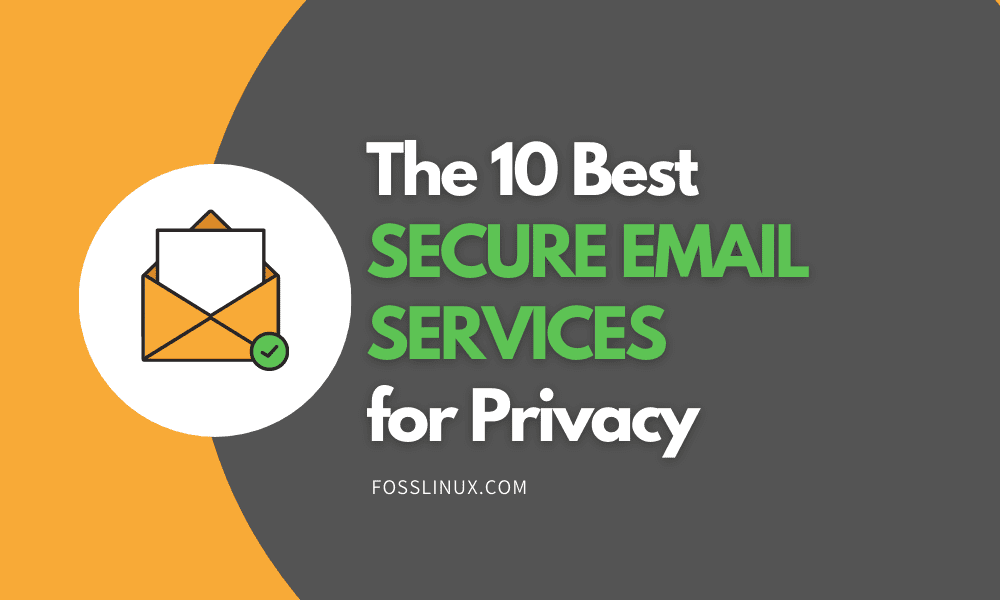The innovative strides of email services came as a faster alternative for the postal services. However, it does not imply that the growing use and embrace of email services have contributed postal services to the messaging world obsolete, for not all messages are transmitted through words. The message communication aspect over a network has to meet some specific guarantees for the end-users to trust these service providers completely. Hence, the key attributes of an email service should be performance stability, privacy, and security.
You would not want to commit to an easily-broken-down system that requires regular maintenance to relay critical messages to prospective clients or customers functionally. A vulnerable network is not a usable network. We can relate to the prominent email services we employ like YahooMail, Outlook, and Gmthail regarding email service security. Can we term these services as secure? Definitely, because insecure systems do not tend to portray the lifespan they are having at the moment. They somehow manage to shield outside attackers or hackers from messing with the message data we send or receive.
However, this security aspect is different from data privacy security, which this article explores. Such an aspect of a security breach might not be harmful but can be a nuisance. Think of it as an individual tress passing through your private property without the intention of causing any harm. Such an act might be harmless at first but will always leave you feeling exposed.
Data Privacy Security
Most email services you might have interacted with have often forced you to adapt to a privacy breach routine. How is it possible? Consider a random daily interaction on the internet where it might require you to use or expose your email address to benefit from some useful service subscriptions. Afterward, you might open your email address and find ads or unrelated subscriptions of which you have no idea how they managed to reside in your mailbox comfortably. A privacy-conscious individual will digest this revelation differently from a regular user.
It is because confidentiality is an important trait for user-shared or stored information. This article has traveled through the deep web and survived some stray bullets to archive the best secure private email services you should consider for your mailing routines. However, nothing is 100% secure on the World Wide Web, but some things are more secure than others. So, our secure email services candidates list relates to the latter statement.
10. POSTEO
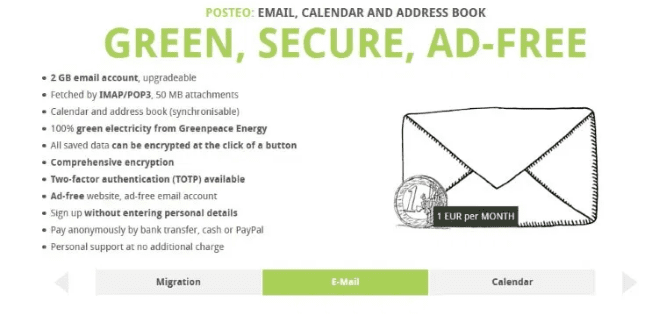
POSTEO Mail Service
This email service mainly exists to meet the privacy and security needs of its user base. An interesting fact about POSTEO is that it is powered by green energy. That means, choosing it would imply that you are siding with an environment-friendly ambassador. We can highlight its features as an open-source email service solution with great support from its open-source community. However, its open-source nature does not imply that it is completely free, but you won’t feel the pinch of its 1 Euro/month annually billed subscription.
It employs the OpenPGP encryption standard to address non-repudiation and data authentication issues. Hence, mail communication through this platform must be authentic for it to receive the green light. The only drawback it presents is the lack of support for custom domains. There is no premium subscription to cater for this feature either, but they offer an upgrade for bigger storage space. You can learn more about this email service from its official site.
9. Tutanota
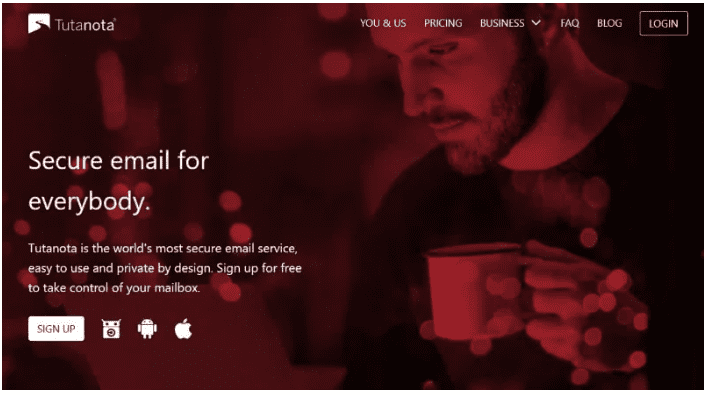
Tutanota Mail Service
This email service provider’s encrypted functionality makes it a perfect fit for both business and personal uses. For free users that want to test the depth of the water, you get a 1GB storage with the option of upgrading to bigger storage viable through premium subscriptions. It supports the users that want to implement a custom domain, but this feature is accessible through a premium subscription plan. If you fancy white labeling, Tutanota will be sufficient for your business.
The privacy remark from this email service provider is through the tools it implements alongside its functionality. These useful tools include end-to-end encryption forms and free encrypted calendars. Its key features include its open-source nature with great support from its open-source community, the provision of the mentioned end-to-end encryption, Availability of 2FA (two-factor authentication) white-labeling. 2FA ensures that only an authorized and authenticated user can perform special actions under such a platform.
It provides two security levels that entail the combined inclusion of your account password and an authentication-generated code sent to your smartphone. Such a system might require these two access codes during a system login or upon the initiation of a user-privileged session. To learn more about Tutanota, visit its official website.
8. ProtonMail
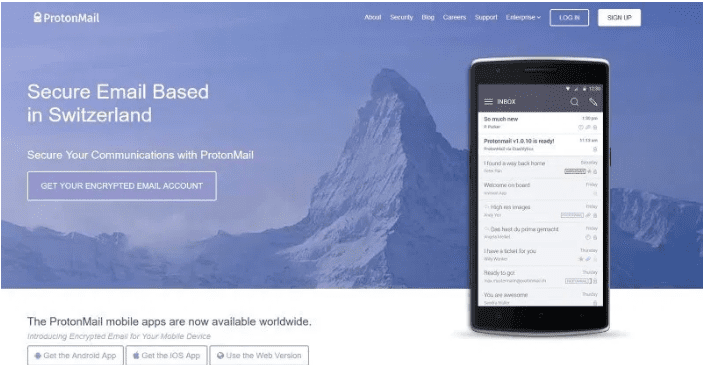
ProtonMail email Service
This Swiss-based email service is continuously growing in popularity. It is open-source with great community support. The end-to-end encryption ensures that its users do not have to deal with any security breach cases. You get to choose between the free and paid subscription options it provides. The free subscription might cater to your basic needs, but the paid subscription grants you access to unlimited rich features. Also, it offers custom domain support but on a premium subscription.
2FA availability is also valid under this email service. A cool feature to cherish from ProtonMail is the use of its self-destruct message functionality. Therefore, you do not need to hold hostage the messages you do not want to keep. You can set these unwanted messages to auto-delete or self-destruct after a specified period. You can visit this email service’s official website to learn more about it.
7. Mail

Mail email Service
This email service provider adds a twist to the privacy and security it offers its users. It gifts you with some customization security. This flexibility is evident when you use the platform to create your email address. It grants you access to a few hundred domains from where you can pick one to link to your desired email handle. Whether you are a user who is after an email domain representing a lifestyle, personality, location, or profession, its personalization will give you that specific identity you want to portray.
Therefore, we can summarize Mail’s prime features as its provision and support for unlimited mail storage, its support for numerous free email services, and the provision of a flexible access channel to your mailbox through a smartphone-supported feature. Moreover, you also get to embrace the needed peace of mind regarding email viruses due to a provided antivirus tool. You can meet Mail in person by following this link.
6. Yandex

Yandex email Service
This email service provider is described as smart and secure and for good reasons. Its smartness regards the ability it has to sync with devices. If you are an android user, Yandex is your match made in heaven. Its support for android devices is extensive. Yandex is an appeal to users who like to have a say in the appearance of their mailbox. For this reason, you can flexibly twist its appearance to rhyme with a specific mood you have in mind.
We can summarize its prime features as follows; this email service provider lets you set the exact time and date you wish to send an email. All you have to do is compose your message and put it on a timer, and once this clock hits, your message will sail away. It also auto-scans all the emails you receive to get rid of harmful viruses or quarantine compromised emails to an existing spam folder.
You do not need to worry about unwarranted exposure to fraud and spam. Moreover, there is some aspect of flexibility in managing your Yandex accounts. One account can be used to control and manage the many mailboxes and services under this platform. You can get an in-person introduction to Yandex by visiting its official site.
5. NextCloud
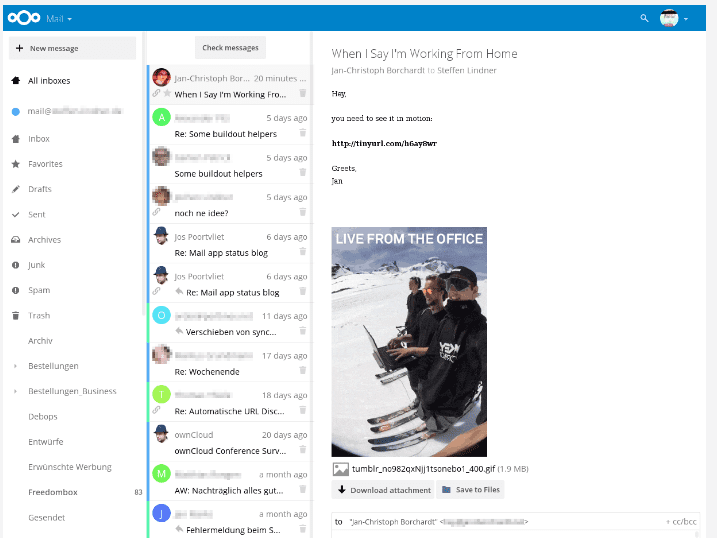
Nextcloud email Service
You might be quick to dismiss this remarkable email service provider as a synchronization software, which includes the likes of Dropbox. However, there is more to what Nextcloud offers its users. It defaults as a cloud-based virtual drive where the cloud in this context is a personal or business server hosted on the internet. It is a mail platform that perfectly functions as a chat platform because of its rich plugin system. Nextcloud offers a full-interaction experience for its users because of such flexibility.
However, the mail plugin that trails this email service provider is limited to an available webmail client’s functionalities and not a mail server. Nonetheless, you can use it to connect to other mail systems. You have the option of establishing a mail server instance like Postfix to work with this email service if you have the Sudo privileges to set it up on a given server. This mail server’s successful configuration will employ this Nextcloud app as the needed front-end because it serves this purpose efficiently.
The developers behind the creation of Nextcloud have opted from recycling or mirroring already established traditional mail features. Hence, they are referencing the Horde mail client’s libraries, which have rich and popularized approaches. More on Nextcloud is found at its official site.
4. Horde
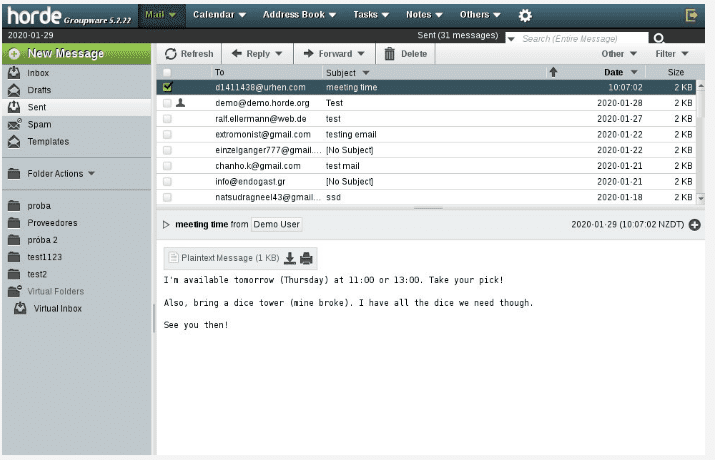
Horde email Service
The services and features this service offers make its identity as a mail client to be an understatement. It is a groupware that is both enterprise-ready and full-fledged. The browser-based interface of this email service suit is likable. It is integrated with several apps that are useful in organizing, reading, and sending mail. It also manages how you use and share notes, contacts, calendars, and tasks.
If you are a passionate developer who wishes to interact with some Horde code DNA, you will be excited about what the Horde project has in store. It provides an app-rich and library-efficient PHP development framework for building a customizable Horde environment. Like Nextcloud, it is also packaged without a server.
You need to seek a mail host alternative like Postfix if you seek to use it independently. The experience this email service offers its users is robust with a UI that perfectly syncs with your desktop and mobile or smart devices. You can meet Horde in person by visiting their official site.
3. Roundcube
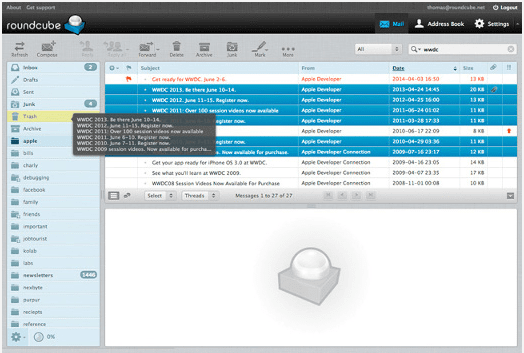
Roundcube email Service
If you are familiar with a standard LAMP stack’s workaround, you won’t face any challenge installing and setting up this modern webmail client. It includes a drag-and-drop functional interface as one of its top features for an improved user experience. It makes interacting with the platform modern and fast.
Other slew system features include address book integration, canned responses, a templating system, spell checking, and over 70 languages translation support. The platform also offers extensive support for additional features through a pluggable API. The GPLv3 license caters to its open-source nature. You can visit Roundcube’s official website to learn more about it.
2. Zimbra
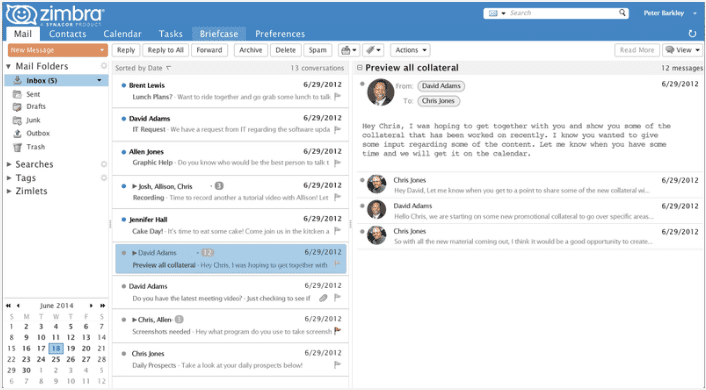
Zimbra email Service
Zimbra should be a familiar candidate name on this list as its use continues to be extensive among individuals and businesses. This email service is a complete package as you do not need to seek a separate email server to host its front-end. It is bundled with both a mail server and a webmail client to create a perfect all-in-one solution.
Different corporate entities continue to brag about the years of service. Zimbra has enabled their businesses to grow and flourish. Its modernized webmail client caters to all the features a mail user might need. It supports the use of folders to manage your mail contact lists efficiently. Moreover, its support for pluggable extensions is another reason to enjoy other rich features supported by the platform. This email service will not alter its performance based on the user device in use. It continues to maintain a performant snappy, and clean interface. For the users that still cherish a native experience, Zimbra provides a desktop client. Its role in the email services open-source community continues to receive praises. The Common Public Attribution License caters for its web client license, and GPLv2 caters for its server code. You can say hello to Zimbra from its official site.
1. Rainloop
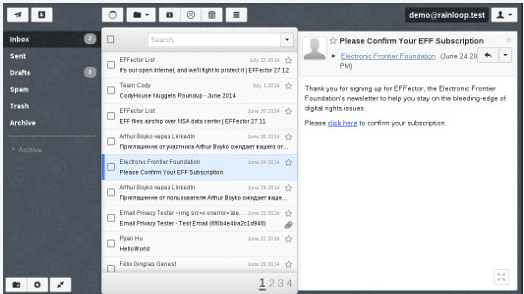
Rainloop email Service
Of all the entries in the previewed best secure private email services so far, Rainloop stands out because of its modern entry. A closer look at its accompanying user interface reveals a design criterion and outlook similar to what you might expect from Gmail and other related commercial email clients. Its great design also hosts great features that are of benefit to its users.
We can list some prominent ones like filtering support, keyboard & drag-and-drop interfaces, and email address auto-completion. Its support for plugins also makes it viable for other extended features. Such plugins also give it the flexibility to enrich a user’s connection experience with prominent online accounts like Google, Facebook, Dropbox, and Twitter. Rainloop adapts well with HTML and faces minimal challenges with complex markup, unlike other mail clients. It offers an online demo for uses that want to receive a first impression. The AGPL license caters to its community edition release.
Final Note
The perfect functionality offered by some of these mentioned email services might contradict your high expectation for personalized features and remarkable UIs. Therefore, it might be a hard pill to swallow, but the need for user privacy and security should not be easily dismissed. An email service’s system performance and functionality should prioritize the need for an outstanding webmail client design.
Choosing a secure and private email service will always cause a collision between the need for a flexibly customizable user-friendly app and the need for a performant yet encryptable mail app. Regardless of which side you choose in this tug of war, the following factors should have a say in your decision-making criterion.
- What is the jurisdiction of the mail service you chose? Jurisdiction applies to the mail service location and user privacy policies in play. You should be familiar with the physical storage location of your data on the world map.
- PGP-like support should be available. Your online presence should be your personal business, and a program like PGP ensures no one interferes with your texts, emails, and files data by employing cryptographic privacy and authentication.
- The existence of an import feature. If you can import your contacts and emails from secondary devices into such a system, it will be easier to set up a communication channel with the target audience(s).
- The encryption rules of such an email service should be slightly considerate. This consideration should grant and not block the useful features users can gain from their interaction with third-party email client apps.
- Whether a user is sending or receiving mail, the encryption should be end-to-end. It should also apply to the email attachments.
- Make sure the basic email features you need are available. They can be DAV support services, inbox search, calendars, file storage, contacts, and collaboration tools.
- Be familiar with the security standards and policies regarding the use of the email service.
- Finally, the stated privacy policies about the email service should be transparent about the user data they might need to collect, the duration for holding this data, and why they need it.

